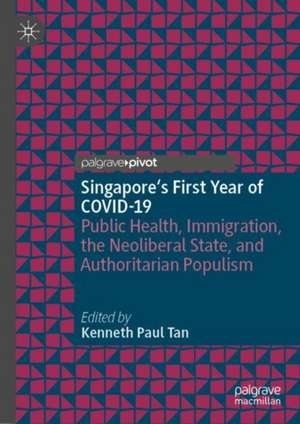Singapore's First Year of COVID-19: Public Health, Immigration, the Neoliberal State, and Authoritarian Populism
Editat de Kenneth Paul Tanen Limba Engleză Hardback – 13 apr 2022
The book focuses specifically on the interconnections among Singapore’s political economy, public health policies, immigration policies, and the elite and pragmatic system of state authoritarianism that, especially since the 1980s, has been at the heart of managing the tensions and contradictions of a nation-state that is also a global city, an important node in a network of goods, services, investments, wealth, people, ideas, and images, all moving rapidly. The chapters critically employ topics and concepts such as neoliberal globalization, authoritarian populism, moral panic, social stigmatization, heterotopia, spatial segregation, and others to make sense of a thoroughly complex situation.
Preț: 289.58 lei
Nou
Puncte Express: 434
Preț estimativ în valută:
55.41€ • 60.38$ • 46.69£
55.41€ • 60.38$ • 46.69£
Carte disponibilă
Livrare economică 02-16 aprilie
Livrare express 18-22 martie pentru 31.54 lei
Preluare comenzi: 021 569.72.76
Specificații
ISBN-13: 9789811903670
ISBN-10: 9811903670
Pagini: 168
Ilustrații: XI, 168 p. 1 illus.
Dimensiuni: 148 x 210 x 18 mm
Greutate: 0.37 kg
Ediția:1st ed. 2022
Editura: Springer Nature Singapore
Colecția Palgrave Macmillan
Locul publicării:Singapore, Singapore
ISBN-10: 9811903670
Pagini: 168
Ilustrații: XI, 168 p. 1 illus.
Dimensiuni: 148 x 210 x 18 mm
Greutate: 0.37 kg
Ediția:1st ed. 2022
Editura: Springer Nature Singapore
Colecția Palgrave Macmillan
Locul publicării:Singapore, Singapore
Cuprins
Chapter One: Neoliberal Globalization, Authoritarian Populism.- Chapter Two: Neoliberal Singapore: Nation-State and Global City.- Chapter Three: Public Health Legacies: Tuberculosis, HIV/AIDS, and Sars in Singapore.- Chapter Four: Tackling Covid-19, The Singapore Way.- Chapter Five: The Contradictions and Challenges of Singapore’s Immigration Policy.- Chapter Six: Migrant Worker Dormitories: Virus in A Neoliberal Politics Of Space.
Notă biografică
Kenneth Paul TAN is a tenured Professor of Politics, Film, and Cultural Studies at Hong Kong Baptist University, which hired him under its Talent100 initiative in February 2021. His books include Singapore: Identity, Brand, Power (Cambridge University Press, 2018), Governing Global-City Singapore: Legacies and Futures After Lee Kuan Yew (Routledge, 2017), and Cinema and Television in Singapore: Resistance in One Dimension (Brill, 2008).
Textul de pe ultima copertă
This book addresses the question of what Singapore's COVID-19 pandemic response in the first year can tell us about the strengths and weaknesses of the Singapore model and what its prospects might be in an increasingly volatile, uncertain, complex, and ambiguous post-pandemic world. As a concise, holistic, and critical documentation of the first year of COVID-19 in Singapore, the multi-disciplinary chapters in this book provide a broad-ranging analysis of an internationally admired model of governance severely tested by a global pandemic crisis whose end is still not in sight.
The book focuses specifically on the interconnections among Singapore’s political economy, public health policies, immigration policies, and the elite and pragmatic system of state authoritarianism that, especially since the 1980s, has been at the heart of managing the tensions and contradictions of a nation-state that is also a global city, an important node in a network of goods, services, investments, wealth, people, ideas, and images, all moving rapidly. The chapters critically employ topics and concepts such as neoliberal globalization, authoritarian populism, moral panic, social stigmatization, heterotopia, spatial segregation, and others to make sense of a thoroughly complex situation.Kenneth Paul TAN is a tenured Professor of Politics, Film, and Cultural Studies at Hong Kong Baptist University, which hired him under its Talent100 initiative in February 2021. His books include Singapore: Identity, Brand, Power (Cambridge University Press, 2018), Governing Global-City Singapore: Legacies and Futures After Lee Kuan Yew (Routledge, 2017), and Cinema and Television in Singapore: Resistance in One Dimension (Brill, 2008).
The book focuses specifically on the interconnections among Singapore’s political economy, public health policies, immigration policies, and the elite and pragmatic system of state authoritarianism that, especially since the 1980s, has been at the heart of managing the tensions and contradictions of a nation-state that is also a global city, an important node in a network of goods, services, investments, wealth, people, ideas, and images, all moving rapidly. The chapters critically employ topics and concepts such as neoliberal globalization, authoritarian populism, moral panic, social stigmatization, heterotopia, spatial segregation, and others to make sense of a thoroughly complex situation.Kenneth Paul TAN is a tenured Professor of Politics, Film, and Cultural Studies at Hong Kong Baptist University, which hired him under its Talent100 initiative in February 2021. His books include Singapore: Identity, Brand, Power (Cambridge University Press, 2018), Governing Global-City Singapore: Legacies and Futures After Lee Kuan Yew (Routledge, 2017), and Cinema and Television in Singapore: Resistance in One Dimension (Brill, 2008).
Caracteristici
Includes a critical discussion of the Singapore model through the lens of a global pandemic Represents an interdisciplinary account of how a nation-state and global city handled a major crisis Reveals the significance of foreign workers in a neoliberal global city
